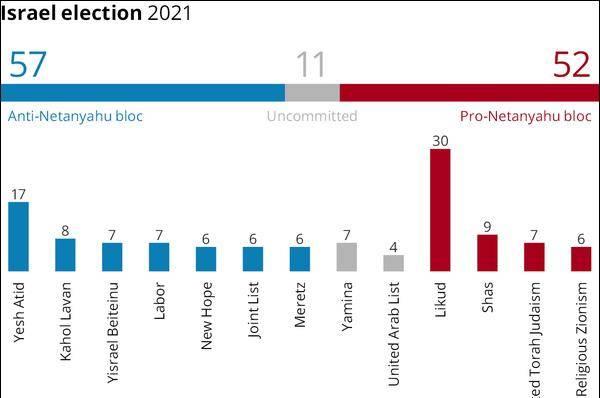In the past two years, Israel has held four parliamentary elections, but the first three parties have been unable to form a cabinet because of insufficient seats in the parliament.
On March 23 of this year, Israel held its fourth parliamentary elections. In May, Netanyahu failed again in his formation of the cabinet. The power to form the cabinet was given to yar Rapid, the leader of the center-left "Owned Future" party, but the anti-Netanyahu coalition has only 57 parliamentarian seats, which is also unable to meet the minimum standard of 61 seats for forming a cabinet.
Netanyahu's former ally, Naftali Bennett, the leader of Israel's center-right small party, the Yamina Party, suddenly announced on the 30th that he would establish an alliance with the anti-Netanyahu political party. That would give the anti-Netanyahu coalition the right to form a cabinet, and Israeli Prime Minister Benjamin Netanyahu, who has been in power for 12 years, risks stepping down.

The anti-Netanyahu coalition has only 57 parliamentary seats, unable to meet the minimum standard of 61 seats for forming a cabinet Picture from the Israeli newspaper Komso
An A former ally of Israeli Prime Minister Netanyahu, Yamina Party leader Naftali Bennett, issued a statement on May 30 saying he would seek a coalition government with the anti-Netanyahu coalition to avoid a fifth election, the Associated Press reported on May 30.
Bennett said in a statement that after the March 23 election deadlock, there was no viable way to form a right-wing government that continued Netanyahu's ruling style. The results of the next election will not change, so it is time to end this cycle. Everyone "needs to postpone the realization of some of their dreams" and focus on "what can be done now".
Naftali Bennett releases a statement on May 30 Image source: Social media
"I intend to do my best to form a government of national unity with my friend Yayer Rapid so that, if God will, we can together save this country from chaos and put Israel back on track," Bennett said. ”
Bennett also accused the country of "losing its ability to function" in the four elections of the past 2 years, and accused the Israeli leadership of "showing hatred and division to cover up defeat." ”
Bennett has already met with the anti-Netanyahu coalition later than the 30th, and the two sides must complete an agreement by Wednesday (June 2). Under the agreement, Bennett and Yar Rapid, the leader of the center-left party of the anti-Netanyahu coalition, will rotate as prime minister for two years, with Bennett taking the lead.
The Associated Press commented that Bennett's "dramatic statement" was an important step toward ending Netanyahu's long reign. If Bennett, Rapid and their other partners can reach an agreement, Netanyahu's 12-year term will come to an end.
Bennett, a former senior aide to Netanyahu and a senior position in Netanyahu's cabinet, endorsed Netanyahu's hardline ideology. He is a former leader of the West Bank settlement movement, leading the Yamina Party, a small party based on religious and nationalist Jews.
Netanyahu condemned
On May 30, after Bennett announced his joining the anti-Netanyahu government, Netanyahu accused Bennett of betraying the Israeli right in a televised address and urged nationalist politicians not to join what he called a "left-wing government."
Netanyahu gives a televised speech Source: Social media
Netanyahu said he had made a proposal to Bennett's party to join Netanyahu's coalition to avoid a "dangerous left-wing government." But Bennett rejected the offers because he "only cares about whether he can be prime minister."
Netanyahu said, "Bennett said a few empty words. He created the biggest scam of the century. His promises were as delicate as feathers. If people knew the truth, then no one but himself would vote for him. His only concern was to be prime minister. ”
On March 23, Israel held parliamentary elections, the fourth in two years in the country. 38 political parties and party coalitions competed for 120 seats. The results show that the Netanyahu coalition won 52 seats and the anti-Netanyahu coalition won 57 seats, but none of the camps won the 61 seats needed to form a cabinet. Because of the large number of small and medium-sized parties, there has never been a single political party formation in Israel's history.
On April 6, Israeli President Rivlin authorized Netanyahu to form a new government, but Netanyahu failed to form a cabinet by the midnight deadline on May 4. On 5 May, Rivlin authorized Rapid to form a cabinet within 28 days.
This article is an exclusive manuscript of the Observer Network and may not be reproduced without authorization.